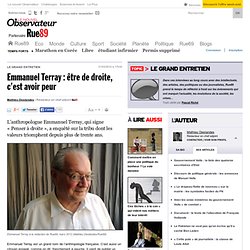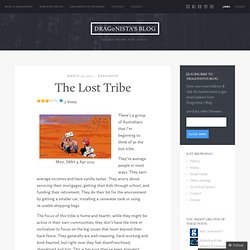

Populismes : la pente fatale: Amazon.fr: Dominique Reynié. Emmanuel Terray : être de droite, c’est avoir peur. L’anthropologue Emmanuel Terray, qui signe « Penser à droite », a enquêté sur la tribu dont les valeurs triomphent depuis plus de trente ans.

Emmanuel Terray à la rédaction de Rue89, mars 2012 (Mathieu Deslandes/Rue89) Emmanuel Terray est un grand nom de l’anthropologie française. C’est aussi un citoyen engagé, comme on dit, franchement à gauche. Il vient de publier un livre, « Penser à droite » (éd. Galilée), dont on a envie de souligner toutes les phrases. En étudiant les écrits des grands penseurs de droite depuis la Révolution française, il a dégagé ce qui constitue leur socle commun, quelles que soient les époques, et quels que soient les « courants » et les traditions dans lesquels ils s’inscrivent. Il nous aide à comprendre pourquoi l’immigration et l’islam sont des obsessions des hommes politiques de droite. Au terme de son enquête, il estime que la vision du monde « de droite » est aujourd’hui hégémonique – et que « François Hollande est un bon reflet » de cette domination. Oui. George Galloway's Respect could help Britain to break the political impasse.
George Galloway celebrates with his supporters after winning the Bradford West byelection.

Photograph: Anna Gowthorpe/PA George Galloway's stunning electoral triumph in the Bradford by-election has shaken the petrified world of English politics. It was unexpected, and for that reason the Respect campaign was treated by much of the media (Helen Pidd of the Guardian being an honourable exception) as a loony fringe show.
A BBC toady, an obviously partisan compere on a local TV election show, who tried to mock and insult Galloway, should be made to eat his excremental words. The Bradford seat, a Labour fiefdom since 1973, was considered safe and the Labour leader, Ed Miliband, had been planning a celebratory visit to the city till the news seeped through at 2 am. Thousands of young people infected with apathy, contempt, despair and a disgust with mainstream politics were dynamised by the Respect campaign. How did we get here? Respect is different. So it’s Carr(ion) If you were asked to present an individual who personally embodied the general strategic orientation of modern Labor, Bob Carr would be a pretty good choice.

Imre Salusinszky’s summed up Carr’s elevation in a piece for the Australian entitled ‘The hard Right man cometh’. ‘The biggest achievement of Carr in office was political,’ Salusinszky explained. ‘[H]e rewrote the manual on modern Labor leadership. Alongside his fiscal conservatism, he appealed to the western suburbs by outflanking the Coalition on law and order. He governed by managing the evening TV news bulletins and the morning “splash” in the Daily Telegraph.’ That combination of free market economics and tabloid populism now defines the modern ALP. What about on foreign policy? Salusinszky again: ‘He will not only be as pro-US as Alexander Downer, he will also be able to match his Washington hosts in Civil War history, as well as the history of the Kennedy administration. The Lost Tribe « Drag0nista's Blog. Moir, SMH 4 Apr 2012 There’s a group of Australians that I’m beginning to think of as the lost tribe.

They’re average people in most ways. They earn average incomes and have vanilla tastes. They worry about servicing their mortgages, getting their kids through school, and funding their retirement. Occupy abundance. When the Occupy movement spread to Australia, many mainstream commentators were incredulous.

Has Australia not been doing exceptionally well, having enjoyed a long summer of economic growth since the 1990s and escaping the worst of the global financial crisis? In a long piece celebrating Australia as ‘the most successful and unique economic and policy arrangement of the late twentieth and early twenty-first century’, Crikey writer Scott Steel (‘Possum Comitatus’) took a swipe at the local Occupiers. The problems we have left in Australia are difficult and sophisticated, requiring a level of thoughtful engagement far beyond the scope of occupying Fuck Knows Where in tents. Misdiagnosing the politics of anxiety. A central belief of Australia’s mainstream Left of recent times is that the Right in its various guises – the Coalition parties, extremists like Pauline Hanson, and shock jocks like Alan Jones – has dominated because of its ability to tap into an irrational politics of fear. journalist David Marr has been a keen critic of this trend, having co-written the definitive account of the 2001 ‘Tampa election’, , as well a more recent book on the Bill Henson scandal .
His latest book, a collection of old and new essays, is called . In it he shows that the manipulation of fear is a central tool in the modern political process, and that its effect has been unambiguously corrosive. Marr describes a series of instances where fear and panic were used to build political capital. He starts with Hansonism and Howard’s early attacks on Indigenous rights, before veering into several essays on the scapegoating of asylum seekers. So why did it take Canberra so long to pursue this sure-fire vote winner? The Experience of Middle Australia - smh.com.au.